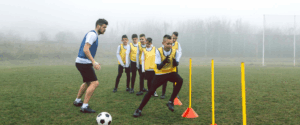Soccer is more than a sport. For kids, it is a stage where they learn about themselves, test their limits, and discover what it feels like to belong to a team. Skills matter, yes, but there is something even more important that shapes how much they enjoy the game and how far they go with it: confidence.
As a parent, you already know how quickly confidence can rise or fall in your child. One day they feel like a star, the next day they come home ready to quit. The ups and downs are normal. What matters most is how you help them through those moments.
Why Confidence Matters in Youth Soccer
Think of the players you notice during a game. They are not always the strongest or the fastest. Often, they are the ones who look sure of themselves. They try things. They make mistakes and keep going. That is confidence at work.
Without it, kids pull back. They second guess every pass. They hesitate instead of taking a shot. Sometimes they even lose the joy that brought them to the sport in the first place. This is why confidence is such a big part of youth sports psychology. It is the mental engine behind performance.
What Confidence Looks Like in Young Players
Confidence is not one simple thing. It shows up in different ways. According to research published in the International Journal of Environmental Research and Public Health, confidence in young athletes can be grouped into four types:
- Belief in skill execution: Trusting they can dribble, pass, or shoot when it matters.
- Achievement: Pride after scoring a goal or hitting a milestone.
- Psychological readiness: Being able to manage nerves before and during competition.
- Tactical awareness: Understanding positioning and teamwork during play.
The same research also found that younger players rely more on tangible, concrete achievements to build confidence. Scoring a goal, completing a drill, or hearing praise from a coach feels more “real” to them than abstract ideas like self-awareness or comfort in an environment. [source]
Your Role as a Parent
If you have ever noticed your child glancing at you from the field, you already know your role is bigger than you think. Kids read our faces and reactions instantly. A smile or a clap builds them up. A sigh or a frown, even without words, can knock them down.
The trick is to focus on effort, not only outcomes. If your child hears “I loved how hard you worked to win that ball back” more often than “Why didn’t you score?” they will start valuing persistence. And persistence leads to growth.
Feedback is fine, but it should feel like support, not criticism. “Next time try keeping your head up when you dribble” is constructive. “You always mess that up” is crushing.
And remember, your child is watching how you handle your own mistakes too. If you get frustrated and stay stuck on it, they will copy that. If you laugh, reset, and move on, they learn resilience.
How Coaches and Teammates Shape Confidence
Parents are not the only influence. Coaches and peers matter a lot. The same study highlights that psychological sources such as coach feedback and social support are powerful influences on player confidence. Positive or constructive feedback from coaches, combined with encouragement from teammates and parents, significantly boosts how young athletes see themselves. [source]
A team environment that mixes encouragement with guidance makes kids feel valued. And when children feel valued, their confidence grows. Choosing coaches who understand this balance can make a huge difference in how a child views both the sport and themselves.
Helping Kids Handle Setbacks
Every child will face hard moments. Missed goals, losing streaks, being benched. It is part of the game. What matters is how they process those setbacks.
Normalize mistakes. Remind them that even professionals miss penalty kicks. Shift the focus by asking, “What did you enjoy about the game?” or “What would you try differently next time?” instead of “Why didn’t you play better?”
Balance also helps. If soccer feels like the only thing that defines them, every mistake hits harder. Encourage them to enjoy other activities, whether that is music, art, or another sport. It keeps their identity broad and healthy.
Simple Ways Parents Can Support Confidence
Here are some practical tips you can use right away:
- Celebrate effort. Applaud the small wins like a good pass or solid teamwork.
- Encourage practice. Repetition builds skills and skills create belief.
- Step back sometimes. Let your child make decisions on the field, even if they are not perfect.
- Highlight teamwork. Remind them that supporting teammates is just as important as scoring.
- Talk with coaches. Keep communication open so your child gets consistent support at home and at practice.
The Bigger Picture
Confidence built through soccer does not stay on the field. It shows up in school, friendships, and eventually in adult life. Kids who learn to trust themselves in sports are more likely to take healthy risks, try new things, and recover when life throws challenges at them.
That is the real gift of youth sports. It is not only about building athletes, it is about building resilient, confident people.
Final Thoughts
Confidence grows slowly, like muscles. It takes practice, encouragement, and the right environment. Parents, coaches, and teammates all have a hand in shaping it.
Your child may never play professionally, and that is okay. What matters is that they enjoy the game and carry the lessons it teaches into the rest of their lives. And one of the most powerful lessons soccer can give is this: believe in yourself, even when the ball does not go exactly where you want it to.





